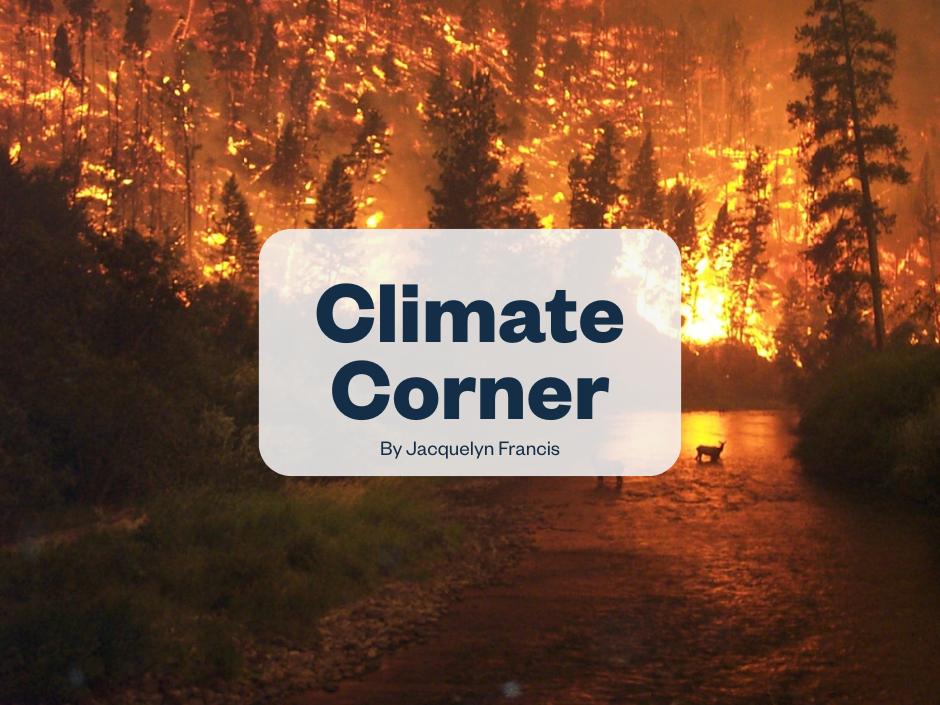Climate Corner: Reflections on COP 28
- Jacquelyn Francis

- Dec 26, 2023
- 3 min read
Updated: Jan 2, 2024
The United Nations holds a two-week climate conference annually called Conference of the Parties. The first COP was held in Berlin in 1995. It was at COP21 in Paris in 2015 that the “Paris Agreement” was signed by 196 “parties” or countries, which required all signatories to report plans and implement best efforts to mitigate greenhouse gas emissions (visit UNFCCC.int for more info). This year’s conference, COP28, was held from Nov. 30 to Dec. 13 in Dubai — a controversial site.
Why the controversy? Because Dubai was a small fishing village that became an overnight sensation — built by oil. Its leader, Sheik Rahid, has overseen an oil-fueled infrastructure and development boom that transformed Dubai into Skyrise City. Recently, oil and gas revenue has been used to diversify the economy into primarily real estate, trading, tourism and financial services. However, its oil ancestry remains palpable. Every Saturday night, over the bay between the marina and The Palm, tourists get to enjoy a hypnotic, high-tech drone story about the glorious (although short) history of Dubai, ending with a QR code that leads to the sponsor’s website, Emirates Oil, of course.
And then there is the 12-lane highway system crammed with weekend traffic going to the completely man-made “beach.” It is hard to find electric cars and solar panels anywhere.
Besides its oil-based foundation, other controversies surrounding the decision to hold COP in Dubai include the illegality of gay rights and human rights violations, including the inhumane treatment of thousands of workers who left their homes to quickly build Dubai.
According to one taxi driver, when he moved to Dubai, the tallest building was about eight stories high. If you Google “Dubai over the last 20 years” a super-fun time-lapse video comes up that’s worth watching. The city literally explodes with development. I’ll return to why I think this is incredibly important in a minute.
COP28 brought together diplomats from all over the world to spend two weeks debating international policy around transitioning away from the fossil fuel economy. Was Dubai the best place for this? The United Nations Framework Convention on Climate Change moves the COP negotiations every year. Similar to the Olympics, but complicated in other ways. Dubai won the “honor,” which is not easy, not profitable and not always seen as a blessing. Hosting COP attracts criticism. Dubai has the infrastructure to host global leaders, plus all the concentric circles of humans that also attend, roughly 110,000 of them.
This leads to further controversy. COP attendance has grown over the years. Yes, this does add to its carbon footprint. And yes, corporate interests show up in big numbers with bigger pocketbooks. Should COP be restricted to diplomats only? I think not, because diplomats argue about the words: should, could, must, will, phase down vs. phase out. I do believe this has value. But the real value is happening much faster in the other parts of the three-ring COP circus.
Innovation is happening in every sector: transportation, building design, energy technology and efficiency, energy storage, cement, steel, fission energy, aviation, ocean energy, agriculture, waste, fusion and more. Having COP as a showcase for this innovation has an impact.
Investors were everywhere with many reaching for their wallets. It’s been a painfully slow adoption rate, but the momentum seems to be building, which is desperately needed. Many economists estimate transitioning from fossil fuels will be a multi-trillion-dollar effort, annually. This means taking the leap into investment risk now will be one of the only ways the world will avoid the worst of climate risks in the future.
Nonprofits were everywhere at every turn, in every pavilion, every panel discussion, every late night gathering — all filled with passionate people working to create a world beyond fossil fuel dependency — all intelligent and hopeful.
So as I was listening to my driver tell me about the explosive years of development that is now Dubai, I reflected on the commitment agreed to at COP: a tripling of renewable energy capacity and doubling energy efficiency improvements by 2030. And it occurred to me that all we need is to get it done. Stop dilly-dallying for God’s sake. If a massive modern city on sand can be built in a few years, then why can’t we modernize our energy systems now?
I believe investing in a planet where survival is both possible and not so oily is worth it.
.png)


